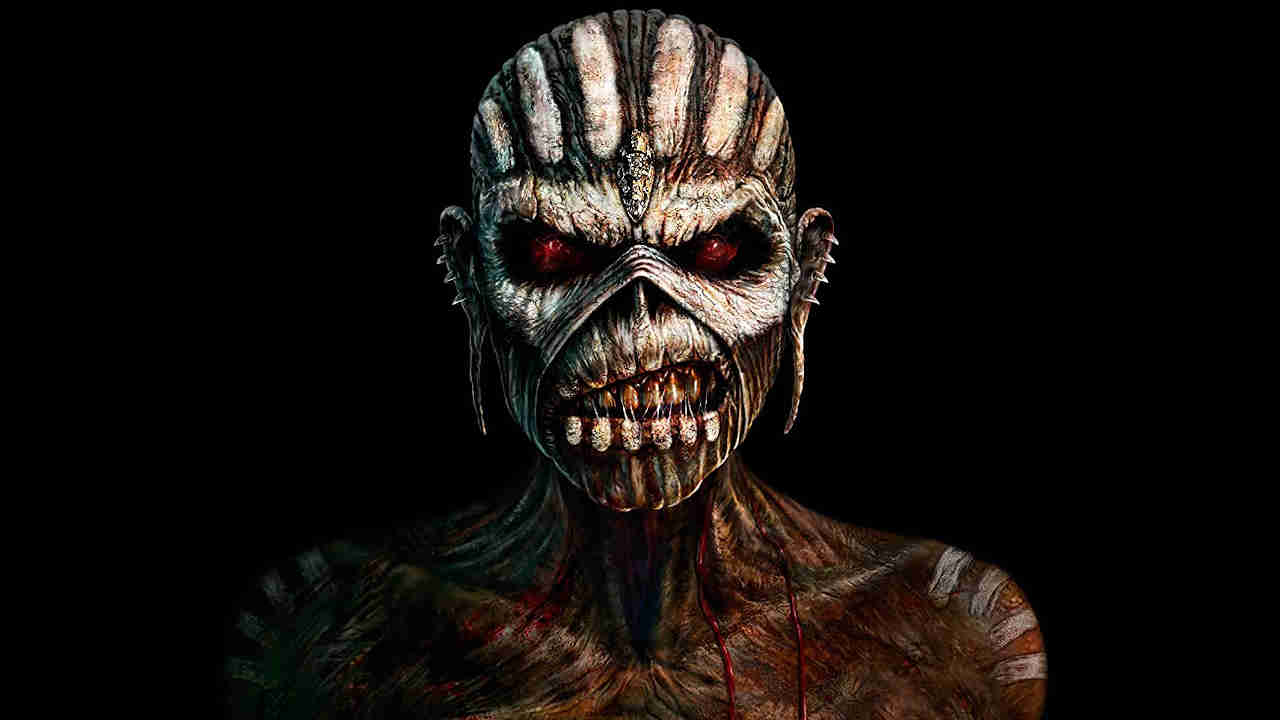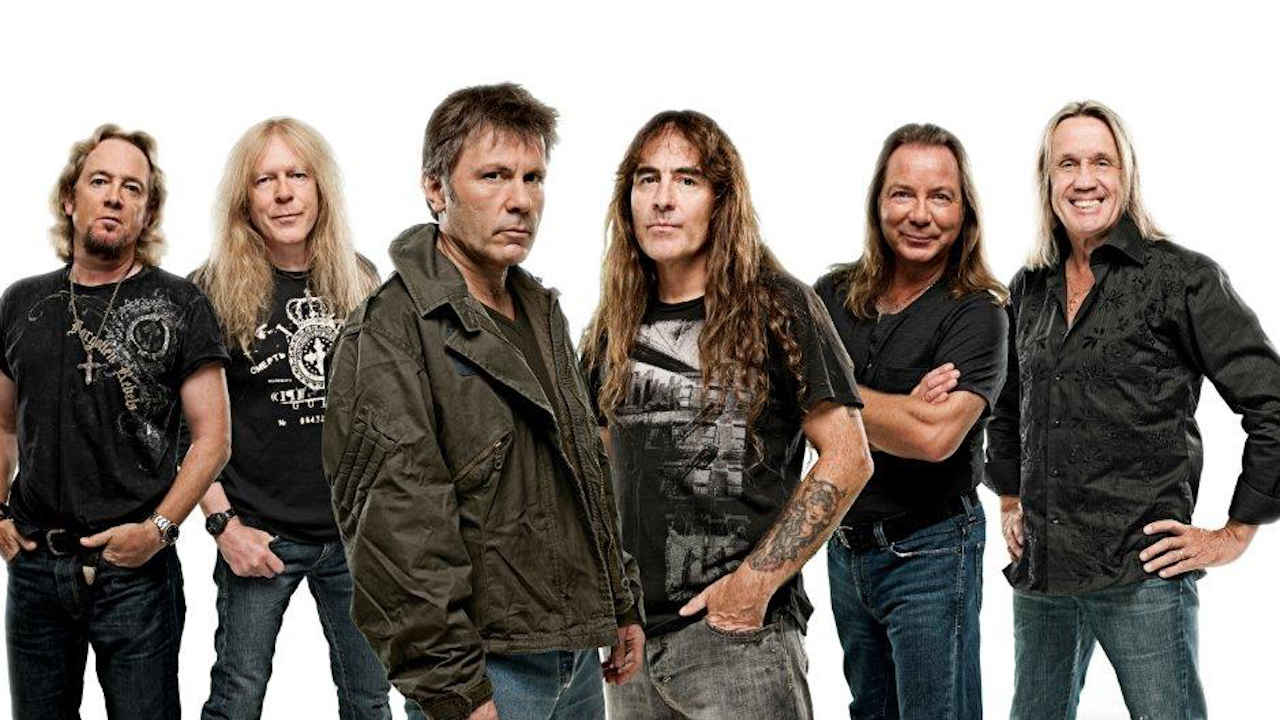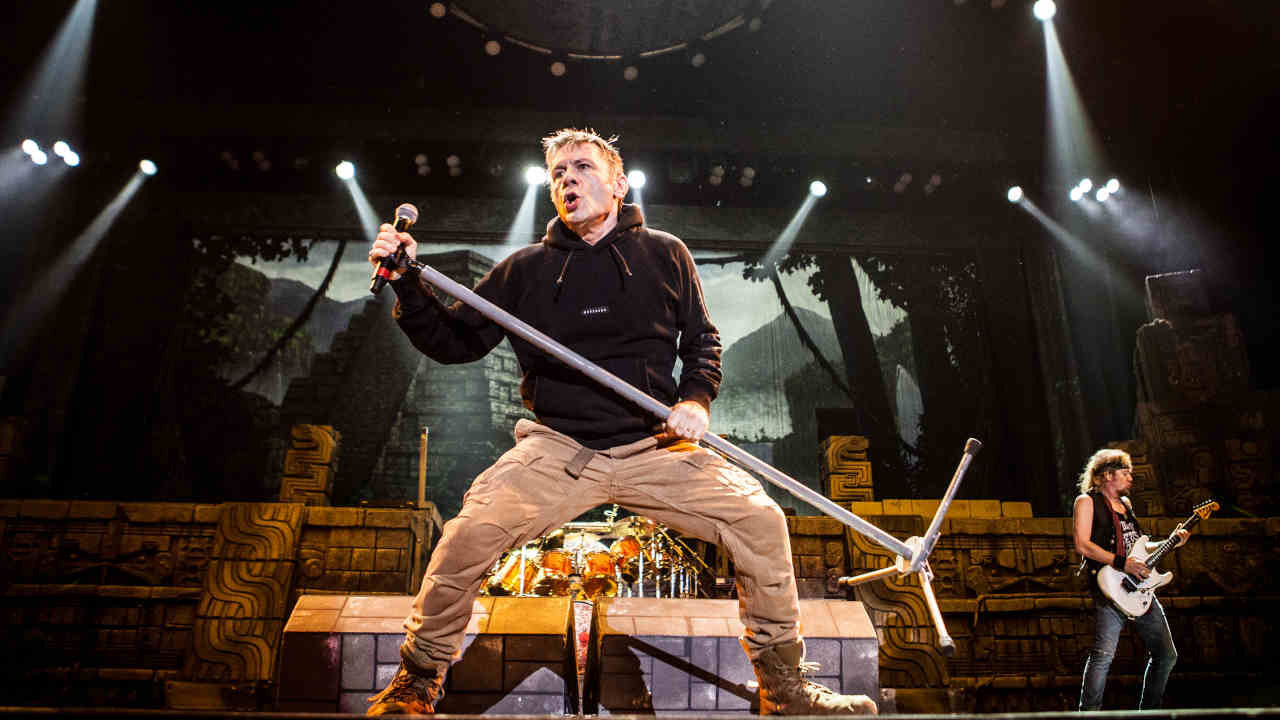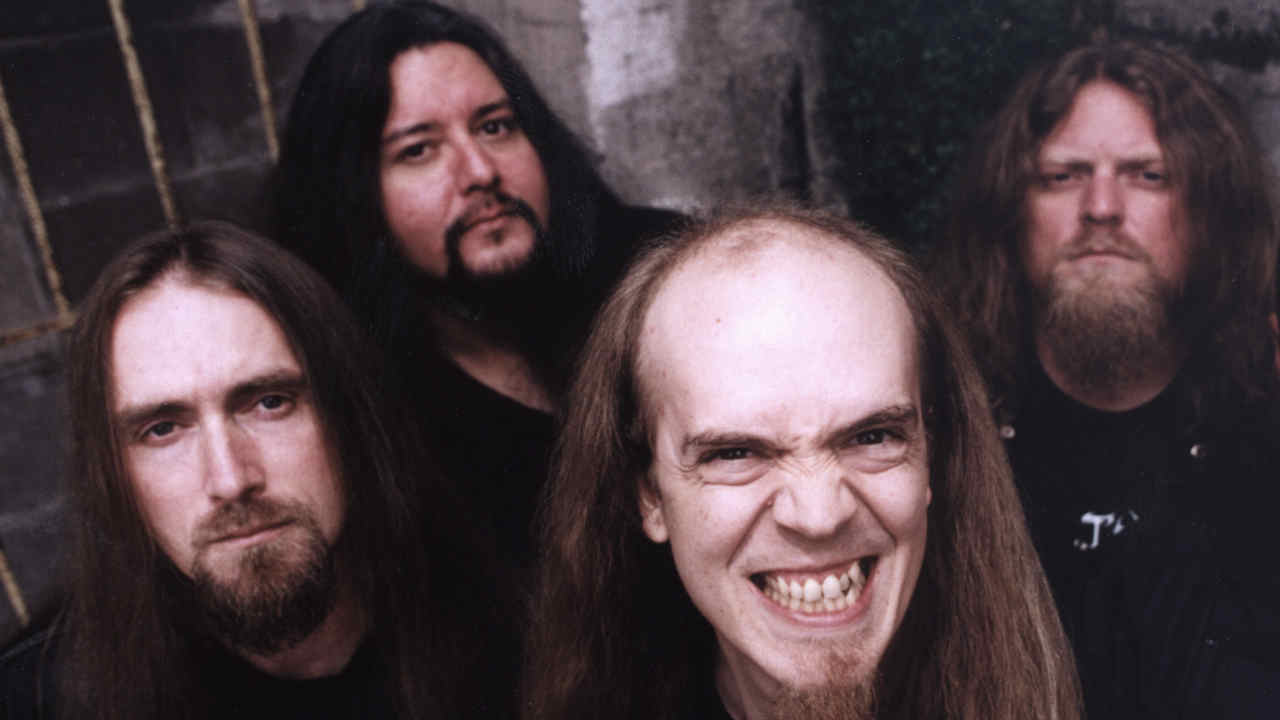How Iron Maiden’s The Book Of Souls became an epic triumph over adversity
In this classic 2015 interview, Bruce Dickinson and Steve Harris reveal the secrets behind Iron Maiden’s most ambitious album ever – and the cancer diagnosis that changed everything

Are you sitting comfortably? It’s time for another implausible tale from the most epic and revered saga in heavy metal history. Having stalked the planet like some imperious, multi-limbed colossus for more than 35 years, fuelled by creative verve, an unerring dedication to hard work and an uncompromising vision, Iron Maiden arrive in 2015 buoyed by an enviable reputation and the love of millions, but also weighed down by fearsome levels of expectation.
Admittedly, the unveiling of every new Iron Maiden album is a major event. This time, however, the album concerned – The Book Of Souls, Maiden’s 16th studio effort – has nearly been overshadowed by events that took place after the music was etched in sonic stone. Back in February of this year, the news broke that vocalist Bruce Dickinson was being treated for a cancerous tumour on the back of his tongue, and suddenly, for the first time ever, Iron Maiden’s impervious steel façade began to exhibit a hint of vulnerability.
In metal terms, Iron Maiden are immortals. Living legends. Heroes. But late in 2014, they were suddenly confronted with the prospect of losing their singer and, as a result, hitting the dreaded career buffers with a chilling thud of finality.
But then, of course, this is Iron Maiden; these guys are made of much sterner stuff and are by no means finished with their tenure as metal’s most-loved band. As the release of The Book Of Souls draws closer, we speak to all six members of the band about the turmoil of the past year and the creation of what may be the finest record that Iron Maiden have ever made...
- The best smart speakers: find the right voice-assisted speaker for you
- View the Best Apple Airpods deals
- Shop for the best Bose deals
- Explore our pick of the best Sony headphones deals
“I had a lump in the side of my neck, like when you get a really bad cold or flu and your glands come up,” says a comfortingly healthy-looking Bruce Dickinson, several months after being given the all-clear from cancer. “I thought it was just some bloody bug, as you do. But it didn’t develop into a cold or flu and I was singing fine. A local French GP came down to the studio and had a little poke at it and a little look down my throat, and he said, ‘Well, you need an MRI of that, you need a CAT scan of your chest and lungs, and we need to stick a needle in that to see what’s inside...’ I was like, ‘Ohhh, shit!’”
Bruce sits back and takes a deep breath, momentarily jarred by the memory but still smiling because, as we all now know, this tale has a happy ending.
“The irony of it was, I went away and got stuck into Google and Wikipedia and everything else,” he continues. “And six weeks before I went to see the doctor, I got the diagnosis spot-on, even down to the kind of tumour that it was. Once I got the diagnosis, I just said, ‘I’m not doing anything now, for the rest of my life, until I get rid of this. It’s my full-time occupation now!’”
Sign up below to get the latest from Metal Hammer, plus exclusive special offers, direct to your inbox!
Bruce was diagnosed with squamous cell carcinoma, a relatively common form of cancer and, fortunately, one that his oncologist1 thought eminently curable, not least because his patient was in fine health and considerably more sprightly than most men in their mid-50s. Of course, Bruce’s reputation as a heavy metal polymath and unstoppable force of nature made him seem one of the least likely people in our world to be struck down with such an illness.
“None of us knew,” shrugs Steve Harris, still exasperated by his friend’s misfortune. “He didn’t know. He’d sung fantastic in the studio. He sounds better than ever, so there was no indication that there was a problem with his throat, but lo and behold, he had a test and it came back that he had a tumour. It was scary stuff. Seeing as he’s the youngest and arguably the fittest in the band, it was a massive shock to him and to everyone else as well. But he’s a very positive person, as we all know. He’s full of beans and he’s a fit guy, so he’s come through it.”
As ridiculous as it sounds, from the outside at least, Bruce’s welcome recovery seemed almost inevitable; his legendary quantities of get-up-and-go propelled him through weeks of gruelling, intimate and intricate treatment and on, towards the happy news that his tumour had gone and his future prognosis was excellent. Job done. Bruce seems to have weathered this storm by delving deep into the science of his treatment – he regales us with an incredibly detailed rundown of everything he’s experienced, eyes twinkling with the enthusiasm of a geek – but nonetheless, beating cancer is an exhausting business and he cheerfully admits to having struggled at numerous points.
“The last two or three weeks were particularly miserable,” he says. “I was on the morphine and a liquids-only diet, and you lose your sense of taste completely. Everything tastes like cardboard, plasticine or sand. I never realised how essential taste is to appetite until I didn’t have it anymore. But what got me through was custard! The inside of your mouth disintegrates for a period of time... it’s called mucositis and it’s not very nice. So I couldn’t speak, because it hurt to use my tongue, but I could take big gulps of custard every day. You end up with the metabolism of a hummingbird during this treatment because you’re being cooked from the inside out, but your body’s also trying to heal itself rapidly, and it goes into overdrive. I think that’s one reason why you lose weight. It’s simply because your system is banging away and then eventually it all dropped back down to normal. It’s fascinating. Basically, I am my own science project!”

Rewind a few months to the autumn of 2014. Maiden were holed up in Guillaume Tell Studios2 in Paris with long-time producer Kevin Shirley, to begin work on the follow-up to 2010’s widely lauded The Final Frontier. Returning to an old stomping ground, they were in high spirits after completing another round of momentous touring that culminated in an all-guns-blazing performance on the hallowed Knebworth turf at Sonisphere. In contrast to some of their arena-filling peers, all six members of Maiden were raring to go, armed with fresh ideas and thrilled by a new opportunity to make music together.
“To be at the studio in Paris was a major influence on the album,” says guitarist Adrian Smith. “We felt at home straight away. It hadn’t changed – it still had the same carpet! The scary thing was that it had been 15 years since we’d been there, and there was a sharp intake of breath there, like, ‘Oh, blimey...’, but once we got going, it was a great environment. I loved being in Paris, for that couple of months. It was the end of the summer and it was beautiful, and inspiring all around. Everyone felt that and it really clicked.”
“It’s a proper recording studio,” notes one of Adrian’s six-string compadres, Dave Murray. “It’s an old French cinema converted into a studio, so the ambience and the vibe are brilliant. It’s beautifully Art Deco with huge, wall-mounted speakers and that old, oaky vibe. And it was familiar territory, which helps a lot.”
“The truth is, the band weren’t quite ready when they arrived at the studio,” reveals Kevin Shirley, ”but Iron Maiden is a juggernaut and it’s not easy to change plans when things are moving! Things happen in people’s lives that make it more complicated, but you can’t stop the juggernaut. But there was a wonderful feeling in the studio. Everyone brought ideas, we recorded songs when they were fresh and everyone played incredibly well. These are challenging songs but they pulled it off. It’s the Maiden album I’m most proud of.”
Indeed, something special happens when these six guys pool their talents. The four previous albums recorded by this – arguably definitive – lineup have been very well received, adding momentum to the band’s ongoing drive to conquer the planet. Maiden consistently defy the usual laws of veteran bands as they near the end of their careers. As far as those involved are concerned, album #16 was approached with the same passion and intensity that informed its 15 predecessors.
“The real magic was that we were so happy to be in the studio together again, like kids in a candy store,” says drummer Nicko McBrain. “The essence of this band is making music together. It’s wonderful to have 30 years under our belt and all these wonderful gigs around the world, but we’re still all about creativity and making a new masterpiece. And that’s what we’ve done.”
- Iron Maiden’s Powerslave: the story behind the most epic metal album of the 80s
- Iron Maiden songs: The 50 best of all time
There is a rather warped symmetry to the way that The Book Of Souls’ gestation and birth have worked out. Despite being impossible to talk about without the looming backdrop of Bruce’s cancer scare casting a shadow, Maiden’s new album would have generated more than enough talking points on its own. Firstly, this is the band’s first bona fide double album3 – clocking in at a staggering 92 minutes in length. Secondly, it’s very obviously the most adventurous and epic record Maiden have ever made. Finally, and most significantly, The Book Of Souls begins and ends with songs written entirely by Bruce – If Eternity Should Fail, quite simply the heaviest opening track in Maiden history, and Empire Of The Clouds, a sprawling, complex and audacious tribute to the doomed final journey of the R101 airship in 1930... which, at a startling 18 minutes and 1 second, is the longest song that Maiden have ever committed to tape. If anything sums up Bruce’s formidable energy levels and wide-eyed delight at the mere thought of embarking on the craziest of projects, this song is it.
“It all started when I won a piano in a raffle!” says Bruce. “Ha ha! I did! I won an electric piano in a raffle. I got it home and started playing around with it. It was around the time that Jon Lord4 got sick. We were talking about possibly working together at the time, so I was mucking about with some things. Sadly Jon left us, but I continued to muck around on the piano. That was the genesis of the whole thing. I was originally trying to write a song about the First World War and the triplane, but then I went round Adrian’s place and we wrote Death Or Glory. That’s a song about triplanes and the First World War, so we’d done that one. I suddenly thought, ‘What about the R101?’... and the idea kept growing and growing.”
Eighteen minutes of wildly evocative and theatrical heavy metal that tells the R101’s tragic story, Empire... is a miraculous and thrillingly fearless piece of work, even by Maiden’s exacting standards. It’s almost as if Bruce was destined to take centre stage this time round.
“I watched Empire... develop from the very beginning,” recalls Kevin. “We mapped out all of Bruce’s ideas and it grew into this monster! The big surprise was how theatrical it became. But it’s such a strong song. Nothing is superfluous. I think Steve was apprehensive about it to begin with, like, ‘How are we gonna do this?’ but it came together beautifully.”
“He had all these bits and pieces on the piano, like a mad professor,” Steve recalls, visibly amused by the memory. “I said, ‘One day it’ll be like Monty Python; I’ll come in and you’ll be sitting at the piano with nothing on, looking over your shoulder like a madman...’ Ha ha! I’m glad that didn’t happen! But when we were recording it, we had a few moments when we were looking at each other thinking, ‘What the hell’s gonna happen next?’ But that just added to it. I actually said to him, ‘Fuck me, you’ve outdone me, you bugger! This is an absolute masterpiece...’ and it is. Empire... is almost a rock opera... it reminds me of a West End musical. But better. Ha ha ha!”
“At a time when people’s attention spans have dropped to as low as they’ve ever been, I love that we’re a band that can come out with an 18-minute track,” says guitarist Janick Gers. “You’re never sure what you’re going to get with Maiden. You know it’ll sound like Maiden, ’cause that’s us, but the possibilities are endless. You can ask, ‘How long is a piece of string?’ Well, Empire... is as long as it is. We’re not scared of doing stuff like that.”

- Every Iron Maiden album – in their own words
- Watch Iron Maiden gatecrash a Polish wedding on the Powerslave tour
If anything encapsulates the humble but steely spirit of Iron Maiden5, it is the way that the band immediately postponed the release of The Book Of Souls and any touring plans when Bruce’s diagnosis came to light. Unlike many veteran bands, Maiden are still very much a united force, both onstage and behind the scenes: friends to the end and all 100% committed to the cause. It’s obvious from speaking to any one of them how much love, respect and mutual admiration exists between them these days. As a result, things tend to go pretty smoothly in the band’s world. But while all six members were clearly delighted by the recording experience, The Book Of Souls was not created without a little turbulence bringing an edge of darkness to the songs.
“Usually we pick a period of time where we want to make the album, we give ourselves ‘x’ amount of weeks to write it, and that’s it,” Steve explains. “It’s always worked well before, but obviously you can’t plan for unforeseen things happening. I won’t give you the sob story, but basically I lost two people, an old schoolfriend and a member of the family, right bang at the time we were supposed to be writing. And when you’re trying to be creative, that’s very difficult. But you can turn it into a positive. If I’m honest, this was one of the hardest times of my life, but the guys were really good about it and really positive and helped me through it. We’ve always done that. Everyone’s had traumas over the years, and we always help each other, and it makes the band stronger. Everyone goes through hard times, and if you get something positive like this album at the end of it, that’s really fine.”
The tough time that Steve describes may have precluded Maiden’s de facto leader from contributing quite as much, in songwriting terms, as he has been known for throughout the band’s history. But one silver lining lurking behind that black cloud is that The Book Of Souls is a much more collaborative effort than most, with everyone except Nicko scoring at least one writing credit. But beyond the finer details, the most striking thing about the album is how cohesive, engaging, substantial and, most of all, exciting it is. There are huge melodies, instantly memorable choruses and moments of triple-guitar abandon by the score, the album’s 92 minutes flying by in what seems like half that time. Everything from Steve’s 13-minute The Red And The Black through to Bruce and Adrian’s double dose of succinct Maiden bombast – first single Speed Of Light and the aforementioned World War I triplane anthem Death Or Glory – oozes the kind of vitality and exuberance that bands of this vintage rarely muster.
“Yeah, it’s terrific. As a double album, it does exactly what double albums should do!” says Bruce with a big grin. “The reason it’s a double album is because it has to be. Rod6, initially, was like, ‘Oh, a double album is a real pain in the arse... can’t you make it like [Guns N’ Roses’] Use Your Illusion I and II?’ and we said, ‘No, it’s a double album!’ As an idea, that’s indescribably cool. No one does them and it’s the sort of thing we should do. For Christ’s sake, we’ve been going in this direction for ages! Ha ha ha!”
Once again, there is a strange symmetry to The Book Of Souls. Steve’s emotional journey during the recording may not have directly inspired any of the album’s songs, but from that title and the otherworldly menace of its stunning artwork, through to the existential explorations of If Eternity Should Fail7 and The Great Unknown, this is an album that revels in the contrast between the strength and effervescence of its creators, while digging deep into humanity’s eternal unanswered questions.
“As you get older, you start thinking about your own mortality and those things more,” notes Steve. “I’ve always been intrigued by those kinds of things. As you get older, more and more it’s there. People are dying and you know that you’ve lived more life than you’ve got left. It’s just a fact. You have to get your head round that and it starts making you feel differently about what’s important and what isn’t... which is probably why we don’t argue about stupid things in Maiden anymore! Ha ha!”
- Iron Maiden: the story behind Seventh Son Of A Seventh Son
- Iron Maiden: The secrets of the Somewhere In Time album artwork
Now firmly on the road to recovery, Bruce Dickinson is living proof that one should never underestimate the resilience of the human body... or, more to the point, Iron Maiden’s extraordinary ability to keep forging ahead, regardless of what slings, arrows and unexpected explosions have been hurled their way. And in keeping with his band’s reliably humble and stoic approach to making music, Bruce is plainly unwilling to dwell on his misfortune or let any aspect of it stand in his way.
“The experience has been kind of life-changing, yes... but also no!” the frontman laughs. “You think, ‘That was a real pain in the arse!’ or a pain in the neck, quite literally in my case, and it’s brilliant to get through it, so let’s just crack on with the rest of life. My determination to get on with things is greater than ever.”
At this point, getting on with things presumably means taking The Book Of Souls out on tour in 2016 – a goal that must have added a little extra incentive to Bruce’s recovery. The details of the next Maiden show are still being ironed out, but what is obvious is that The Book Of Souls’ vivid imagery8 will lead to a truly spectacular stage production, in keeping with the same dizzyingly high standards that earned the band a Silver Clef Award from music therapy charity Nordoff Robbins for their “outstanding contribution to UK music” back in July. Outstanding? We should fucking say so. And then, if we cross our fingers and pray really hard to the metal gods, there might just be another epic, victorious tale to tell in a year or three. Would you seriously bet against them?
“To be there with these guys making this wonderful music after all these years, it’s an amazing feeling,” Nicko concludes. “We’ve still got this amazing voice, collectively, that the Maiden fans know and love, but we’ve still got new kids coming to our shows, too, and when they discover that we’ve been going for 35 years and we’ve got 16 studio albums... well, what a great legacy, you know?”
“We do what we want to do, and not many people can say that,” adds Steve. “Being paid to do your hobby, effectively, for as long as we have... it’s the best job in the world. We’ve made some great music and it’ll live forever, won’t it? But what matters now is getting out there and playing for the fans again.”
“Nothing is going to stop me getting on that stage,” concludes Bruce, with a defiant frown. “You would have to shoot me! Even then the others would drag the corpse on! People say, ‘Don’t you get bored of having to go on tour again?’ No! Never again will I ever say that I’m bored with the idea of going on tour with Iron Maiden. Let’s get it on, you know?”
Published in Metal Hammer #274

Dom Lawson began his inauspicious career as a music journalist in 1999. He wrote for Kerrang! for seven years, before moving to Metal Hammer and Prog Magazine in 2007. His primary interests are heavy metal, progressive rock, coffee, snooker and despair. He is politically homeless and has an excellent beard.
